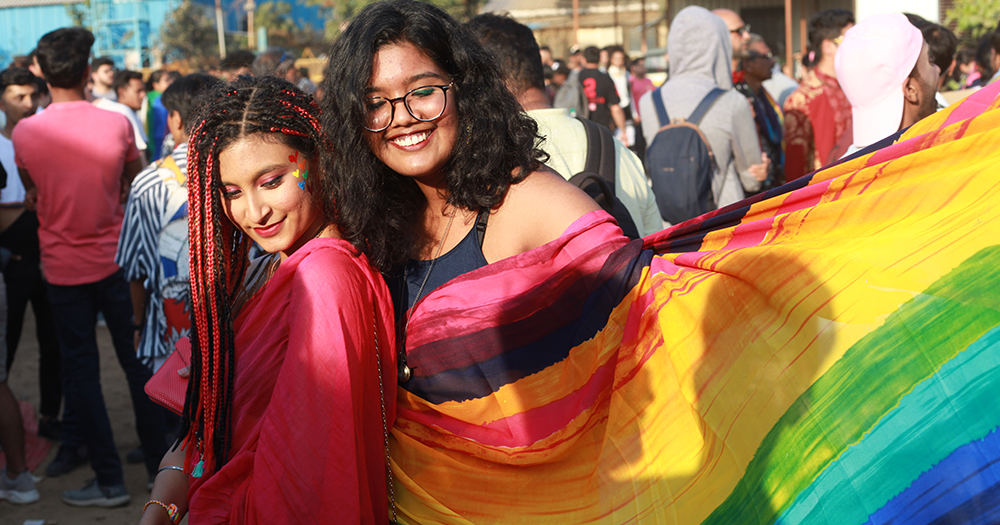Members of the Indian Supreme Court are considering legalising same-sex marriage. As of Tuesday, April 18, the five-judge panel is hearing from 51 petitioners in India, with the review process expected to take approximately two weeks.
This comes after various courts across the country received appeals and petitions from residents requesting the legalisation of same-sex marriage last year. The Supreme Court decided to bundle these petitions together and review them.
The hearings will debate the rights of LGBTQ+ people to consider if they can get married and gain equality under the law. The case will also consider the rights of gay couples to adopt children.
first UN nation from Asia to do so. This will indeed be a massive victory for LGBTQIA+ rights in the world.#SupremeCourt #SameSexMarriage #LGBTQIA #EqualRights
2/2— தமிழச்சி (@ThamizhachiTh) April 18, 2023
Dozens of LGBTQ+ individuals and activists have already weighed in. At the forefront of the case are Kavita Arora and Ankita Khanna.
The Delhi couple has been in a relationship for 11 years. Khanna said, “We realised that this isn’t just about us. This is about so many of the young people we meet and the kind of future that they should have without thinking that just because they’re queer, they can’t have an identity and a life.”
Hundreds of #LGBTQ activists rallied in New Delhi in the first gay pride parade since India's highest court decriminalized homosexuality pic.twitter.com/2jsk9zuyQ9
— Bloomberg Originals (@bbgoriginals) November 26, 2018
However, the nation’s government has called the practice an “urban elitist concept” that undermines religious and social values. While the statement has evoked strong reactions from the community, it is not unexpected.
Passing marriage equality would be a huge milestone in India, a country that continues to maintain traditional patriarchal ideals about the practice. Research shows that only about 37% of the population supports same-sex marriage, and the Indian government recently refused to promote a gay lawyer to the Supreme Court.
On Monday, April 17, the Hindu nationalist government submitted an affidavit to the Supreme Court, which opposed same-sex marriage, claiming, “A valid marriage is only between a biological male and a biological woman,” and requested that the case be thrown out.
Rohin Bhatt, an openly gay lawyer fighting for LGBTQ+ rights in the nation, said, “It’s about fundamental rights of citizens. What we are asking for as queer people in this country is merely that the rights which exist for heterosexual couples be extended to us; nothing more and nothing less.”
?? India's Supreme Court will tomorrow start hearing final arguments on a number of petitions seeking to legalise same-sex marriage.
?⚖️ The court has said the hearing will be "livestreamed in public interest". pic.twitter.com/BF8dWMxmoq
— Openly ?️? (@Openly) April 17, 2023
The hearing is being live-streamed and is available for anyone to watch.
If the court legalises same-sex marriage, India will become the 35th country in the world to do so and just the second Asian country to reach the milestone, after Taiwan.
In 2014, the Indian Supreme Court approved a case that recognised transgender people as a “third gender”, and since decriminalising homosexuality in 2018, the country has experienced a gradual societal shift. India has hosted Pride marches in major cities and queer people are increasingly visible in television and popular culture.
© 2023 GCN (Gay Community News). All rights reserved.
Support GCN
GCN is a free, vital resource for Ireland’s LGBTQ+ community since 1988.
GCN is a trading name of National LGBT Federation CLG, a registered charity - Charity Number: 20034580.
GCN relies on the generous support of the community and allies to sustain the crucial work that we do. Producing GCN is costly, and, in an industry which has been hugely impacted by rising costs, we need your support to help sustain and grow this vital resource.
Supporting GCN for as little as €1.99 per month will help us continue our work as Ireland’s free, independent LGBTQ+ media.
